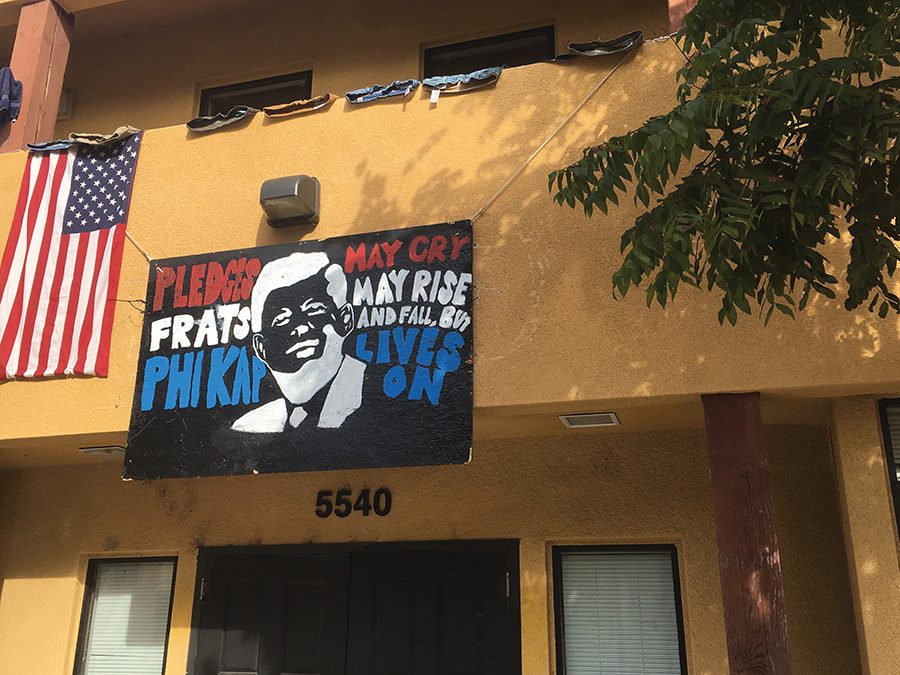A fraternity kicked off campus last semester had a six-year history of violations before the university finally expelled it, documents obtained by The Daily Aztec show.
The final straw for Phi Kappa Theta was a September incident involving apparent underage drinking, and not even an eleventh-hour email from its former president Chris Thomas — from his official A.S. officer email account — could save the fraternity from expulsion.
Emails obtained via a California Public Records Act request also show both the university and the fraternity’s national office moved to prevent information about the chapter’s expulsion from being released to the public.
Administrators stonewall
After the fraternity’s expulsion, emails show administrators moved to shield Phi Kappa Theta’s policy violations from the public eye.
When The Daily Aztec inquired about the specific reasons for Phi Kappa Theta’s removal, Caryl Montero-Adams, the assistant director of Student Life and Leadership for Greek life, told an SDSU media relations officer in an email that in the past, officials “have communicated the founded policy violations (ex. alcohol) without disclosing the specifics related to the incidents. That said, I believe that any specifics given would need to be discussed and approved with (Dean of Students Randy Timm and Associate Vice President for Student Affairs Christy Samarkos).”
The specifics were ultimately not provided to The Daily Aztec until a California Public Records Act request was submitted.
The national Phi Kappa Theta organization also would not return requests for details on why the fraternity’s charter was revoked.
“(The Daily Aztec) reached out to us again over the weekend looking for more specifics,” Robert Riggs, national executive vice president of Phi Kappa Theta, said in an email to Montero-Adams. “We determined that no additional information would be shared and did not respond to his follow up request.”
A history of violations
The San Diego State chapter of Phi Kappa Theta had a long history of brushes with university administrators.
In February 2011, it was placed on an interim suspension for unspecified alcohol violations.
In April 2012, it was suspended after then-Sigma Alpha Epsilon president Barzeen Barzanji died of an overdose at the Phi Kappa Theta house. The fraternity was later absolved of responsibility in his death.
In Fall 2013, Phi Kappa Theta was reported to university officials for two separate parties with alleged alcohol violations.
In January 2014, the university again placed the fraternity on an interim suspension for the violations in the fall. The national Phi Kappa Theta office then placed the SDSU chapter on a complete suspension in February.
In September 2014, the fraternity again faced allegations about alcohol violations, and the following month an unapproved event with alcohol was hosted in which a student fell from a balcony at the chapter house.
The fraternity was placed on another interim suspension in October 2014.
A little more than a year later, in December 2015, a Phi Kappa Theta member was involved in a physical and verbal altercation at the chapter house that resulted in him being taken to detox.
And in September 2016, a social event resulted in fraternity members being treated for intoxication while another event was found to have included new members — who are usually underage — drinking alcohol.
One person, who identified themselves only as a fifth-year senior and a “concerned Greek,” expressed concern in an email to Montero-Adams about the September 2016 incidents. The person mentioned a Snapchat video they claimed showed Phi Kappa Theta members drinking hard liquor during the university dry period, which lasts from Aug. 1 to Oct. 1 of every year.
The “concerned Greek” also included an image of a Snapchat message purportedly sent from a Phi Kappa Theta member soon after the fraternity was taken off probation.
The message read:
“Silence is over and PHI KAP IS BACK!! We just gave out bids to the tallest, strongest, make-you-drip-from-down-unda frat stars on campus. Tomorrow night, we all black them out and welcome them to state the right way. Handles and all sorts of things will be going down throats tomorrow night, so mob Tiki at (address redacted) 63rd st. at 9:30 if you want your world changed forever. These kids are f***ing sick. We’re back, so let’s black.”

The word “black” refers to blacking out — the practice of getting so drunk that one has no memory of events that occurred.
The fraternity was, once again, placed on interim suspension by the university and complete suspension by the national office. In January 2017, the university placed it on “suspension in abeyance.”
Members were told that any further violations would result in the fraternity’s removal from campus.
Alcohol violations were far from the only thing the fraternity drew university administrators’ attention for.
In March 2016, officials reported the fraternity for physical altercations during a philanthropic event. Fraternity member Alex Shapiro — who at the time was running for Associated Students vice president of financial affairs — was also found to have lied to administrators about completion of “release of liability” waivers for the event.
Just two months later, in May 2016, fraternity members threw glass bottles at the fraternity house director, Isaiah Adouna, in the courtyard of Fraternity Row. Those students were later expelled from the fraternity.
In October of that year, an unidentified resident of a home on Dorothy Drive emailed university administration to report an intoxicated Phi Kappa Theta member attending a nearby party urinated on her front yard, followed by three female attendees of the same party urinating in the same location.
“If you, Greek Life, truly values community wellness and relation, please control your members,” the email read. “Urinating in private property is a misdemeanor up to a year of jail time. My house is not a public restroom.”
When the final alcohol violation was reported in September 2017, the fraternity was in dire straits.
The final straw
At 1:50 a.m. on Sept. 2, 2017, an unnamed student was given medical aid after being found “highly intoxicated” in a restroom at Olmeca residence hall.
According to a police media bulletin, the student indicated to officers they had been drinking at “Phi Kap.”
The student also confirmed to a Phi Kappa Theta representative they had been drinking at the fraternity. An Olmeca resident advisor interviewed by Montero-Adams said the student had used the name “Phi Kap” twice.
The September incident was at least the ninth time the fraternity had been reported for alcohol policy violations in the last seven years, and at least the fifth time it had faced disciplinary action within that time span.
In October, A.S. Vice President of University Affairs Chris Thomas emailed SDSU Vice President of Student Affairs Eric Rivera from his official A.S. email account to ask for a meeting about the fraternity.
“I am begging you to please consider a meeting with me before you sign that letter to close our chapter here at SDSU,” Thomas said in the email. “You know my character and what I stand for when it comes to my values. I am asking this as a friend and leader on the campus to please take the time out of your day, whenever it might be, and give me even 10 minutes to be able to talk to you about this situation.”
The meeting with Rivera was never held, though Thomas did meet with Associate Vice President for Student Affairs Christy Samarkos.
“I was just advocating for my chapter in any way I could,” Thomas told The Daily Aztec in an interview.
Samarkos said Thomas asked her if there would be any further opportunities for review of the investigation into the fraternity.
“I like to be thorough,” she said. “I just by nature went through and reexamined everything. I’m not sure if Chris asking for it is what created that.”
This history of violations ultimately led to the national fraternity’s decision to revoke the SDSU chapter’s charter, even before the university removed the organization from campus.
“The reality is even if the appeal by the students is upheld and the University doesn’t remove recognition, the Fraternity Board has already made their decision to revoke the charter,” Riggs told Montero-Adams in an October 2017 email. “The best case scenario the collegiate members could hope for at this time is a student organization that has no national affiliation with the Phi Kappa Theta Fraternity.”
On Nov. 6, 2017, the national board made an official announcement, and SDSU soon followed suit, barring Phi Kappa Theta from campus for a minimum of seven years.
On Nov. 7, after a meeting between university officials and Phi Kappa Theta, Adouna emailed Montero-Adams to apologize for some of the fraternity members’ conduct.
“I want to thank you again for taking the time to speak and answer questions at last night’s meeting,” Adouna said in the email. “I also want to apologize for some of the inappropriate remarks made by some of those individuals. As you know, their language and behavior neither reflects the values nor ideals of our ideal fraternity member. I am truly embarrassed by the lack of respect these individuals had for our efforts.”
Montero-Adams replied about 20 minutes later.
“Thank you for your message and for your presence last night,” she said. “I have valued your partnership over the last few years, including during difficult conversations like last night’s. I know that the students were experiencing a plethora of emotions and understand that their reactions don’t reflect the fraternity. Please let me know if there is anything I can do to assist with the efforts of Phi Kappa Theta. Thank you for your ongoing support and partnership.”












